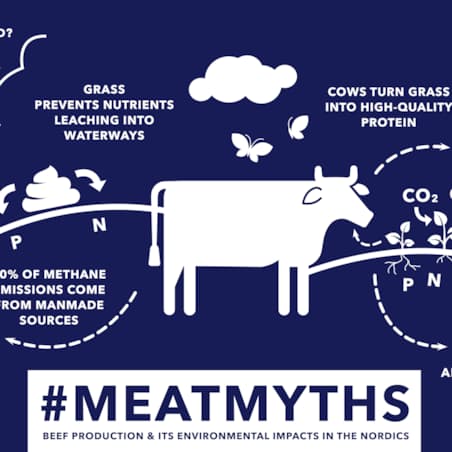When we make our New Year’s resolutions, we usually promise ourselves that we’ll exercise more and eat more healthily. But how to make these resolutions last and what other sustainable decisions could you make?
1. Make small and lasting changes to everyday life
When thinking about weight maintenance, one of the most important things is to eat regularly. For adults this means eating every 3-4 hours. A regular meal rhythm also helps you to keep your meal size moderate. Eat what you consume. Eating over your own need is also in a way food waste. In addition to eating, pay attention to your daily activity. Try to increase your daily amount of steps. You can collect the steps any way you like, the most important thing is that you do it regularly.
2. Eat according to nutrition recommendations
When your diet is versatile and moderate, it is then more likely also healthy and sustainable for the environment. Remember to follow the plate model: keep the main focus in vegetables, vary your protein sources between meat, fish and veggie proteins. Pay attention to the quality of fat, choose whole grain wheats and remember there are plenty of interesting spices to use instead of salt. Prefer local food and utilize season’s best ingredients.
3. Reduce food waste
Producing, transporting and preparing food causes emissions. So if food ends up in the garbage, emissions are caused for no good reason. Here are some good tips to reduce waste: Buy food according to a premade plan, check the expiry dates on the products to make sure you use them in time. Don’t buy food packages that are too large, either. Store food in transparent containers and place the products that spoil the quickest at the front of the refrigerator where you’ll remember to use them. Remember: “Yesterday’s” fruit and vegetables can still be used for cooking.
4. Think about your consumption choices and recycle
The Earth Overshoot Day means the date on which humanity’s resource consumption for the year exceeds Earth’s capacity to regenerate those resources that year. In 2018, for example in Sweden and in Finland the day was in April, which is four months earlier than the world’s average. So think critically what you buy, recycle the things you do not use anymore and favour domestic. Instead of material gifts, many appreciate services, for example a gift card to a spa.
5. Reduce the use of disposables
When you go to the store, take your own shopping bag with you, prefer tab water and have your own cup with you when buying take-away coffee.
6. Sort your waste
The most important thing is to avoid generating waste. But when you have waste, make sure to sort them correctly so they can be recycled and used again. The sorted waste generates raw materials for industry or soil, for example, or energy. Remember also to recycle plastic packages. Plastic protects food and has an important role in reducing food waste. Remove caps and lids. This will facilitate the further processing of packages.
7. Choose domestic meat
Domestic meat is a responsible choice. The animals are eating locally produced feed from own fields, they get fresh water to drink and they are not given any antibiotics for preventive purposes. Domestic meat is local food that employs local producers.
8. Lower your home temperature and pay attention to lighting
When you lower the indoor temperature at home by one degree Celsius you will reduce your electricity bill by five percent. At the same time, you’ll save energy. Pay attention also to your lights at home: switch them off from rooms where you are not spending time and change to led lights where possible.
9. Make a climate-friendly electricity contract
An electricity contract is an important ethical choice, because fossil energy sources cause emissions. Renewable energy sources, i.e. solar, wind, water and nuclear power, are not causing emissions and are not necessarily more expensive either. So familiarize yourself with the offering.
10. Use public transport and reconsider your destination
Transportation sector causes approximately a fifth of emissions to the air. You can reduce emissions by using public transport or a bicycle whenever possible. If you do need to use a car try to share the ride. And could you find a closer holiday destination rather than one far away?
Source: Soile Käkönen, Health and Nutrition Manager at HKScan.










